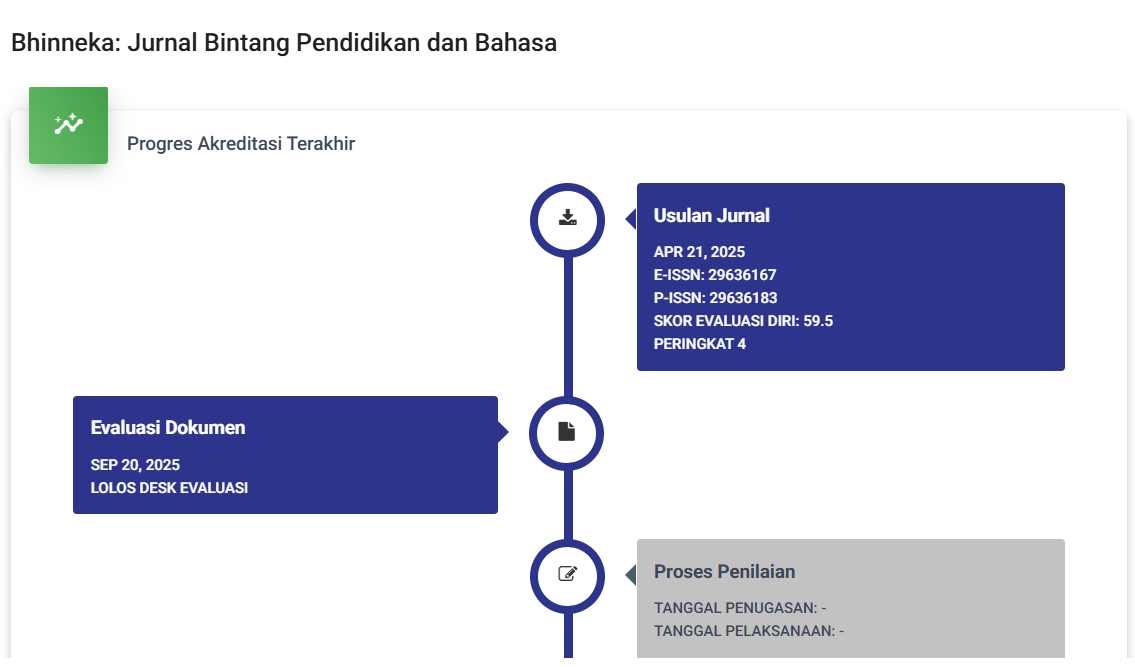Analisis Presuposisi Dalam Wacana Iklan "Raya Takaful Ikhlas 2024”
DOI:
https://doi.org/10.59024/bhinneka.v2i3.864Keywords:
Presuppositions, AdvertisementAbstract
Advertising as one of the forms of communication has an important role in introducing a product that is goods or services to the society. And advertising is one of the parts of the discourse, which is called the advertising discourses. This study aims to describe the assumption analysis in the Takaful Ikhlas 2024 publicity discourse. As for the method used in this research, it is qualitative descriptive. The source of the data used is data collected using the technique of logging and logging. The researchers took a video of the Takaful Ikhlas 2024 publicity, and then recorded all the announcements for classification and analysis. The subject of this study is Takaful Ikhlas 2024. Data analysis process using data reduction, data display (data presentation), conclusion withdrawal (verification). The results of the study found that there are six types of assumptions found: 1) factual assumption (following the vocabulary that can be considered as a fact), 2) non-factual (assuming not true), 3) structural (constantly and conventionally that the part of the structure has been assumed to be true), 4) lexical (interpreting not expressed as understood), 5) existential (associating the existence of an existence), and 6) contractual (not just untrue but the opposite of the truth or not of the fact).
References
A’la, M. 2010. Super Kreatif, Gokil, dan Murah Membuat Iklan. Jogjakarta: FlashBooks.
Chaer, A. 2010. Kesantunan Berbahasa. Jakarta: Rineka Cipta.
Chaer, A. 2014. Sosilinguistik Pengenalan Awal. Jakarta: PT Rineka Cipta.
Christian, M. 2019. Telaah Keniscayaan Iklan Di Kanal Youtube Sebagai Perilaku Khalayak Di Kalangan Milenial. Jurnal Magister Ilmu Komunikasi, 5(2), 141 -158
K. Abdullah. 2018. Beberapa Metodologi dalam Penelitian Pendidikan dan Manajemen. Gowa: Gunadarma Ilmu.
Khotimah, K. 2022. Presupposisi Dalam Slogan Iklan Minuman di Televisi Kajian Pragmatik. Jurnal Bahasa, Sastra, dan Budaya, 9(2), 185-196.
Munawaroh, H. 2017. Wacana Iklan Komersial Produk Kecantikan pada Media Sosial Line. Skripsi. Universitas Sanata Dharma Yogyakarta.
Mawardi, D. 2023. Presuposisi dalam Wacana Iklan Telepon Genggam di Aplikasi Shopee pada Bulan Februari 2022 dan Implikasi Pembelajaran di SMA. Jurnal Pendidikan Tambusai, 7(1), 647-653.
Mahsun. 2014. Metode Penelitian Bahasa: Tahapan Strategi, Metode, dan Tekniknya. Jakarta: Rajawali Press.
Maswardi. 2011. Pendidikan Karakter Anak Bangsa. Jakarta: Baduose.
Mayasari & Yulyanti, Yuyun. 2020. Implikatur Dalam Wacana Kampanye Pemilihan Legislatif. Jurnal KIBASP, 3(2), 276 – 288
Purwanto, B. E, & Purnomo, P. 2016. Bentuk dan Fungsi Presuposisi Wacana Iklan pada Alat Transportasi di Wilayah Pantura Kota Tegal. Skripsi. Universitas Pancasakti Tegal.
Rustono. 1999. Pokok-pokok Pragmatik. Semarang: CV. IKIP Semarang Press.
Rahardi, K. 2019. Pragmatik Konteks Intralinguistik dan Konteks Ekstralinguistik. Yogyakarta: Amarabooks.
Rubiah. 2011. Pengaruh Sikap Siswa Dalam Proses Pembelajaran Terhadap Prestasi Belajar Pendidikan Agama Islam Siswa Madrasah Tsanawiyah Al- Huda Pekanbaru. Skripsi. Universitas Islam Negeri Sultan Syarif Kasim Riau Pekan Baru.
Sholihatin, E. 2019. Kajian Presuposisi Pada Tuturan Makian Masyarakat Arek. Jurnal Bahasa dan Sastra Indonesia, 4(1), 39-43.
Sudaryat, Y. 2009. Makna dalam Wacana. Bandung: Yrama Widya.
Yule, G. 2014. Pragmatik. Yogyakarta: Pustaka Pelajar.
Yule, G. 2006. Pragmatik. Yogyakarta: Pustaka Pelajar.
Zevira, E. 2019. Analisis Praanggapan Dalam Iklan Produk Kecantikan Di Youtube. Jurnal Bahasa dan Sastra Indonesia, 4(2), 27-38.
Downloads
Published
How to Cite
Issue
Section
License
Copyright (c) 2024 Bhinneka: Jurnal Bintang Pendidikan dan Bahasa

This work is licensed under a Creative Commons Attribution-ShareAlike 4.0 International License.








